 It’s a funny thing. If you ask me what my favorite episode of most of my favorite anime is, I can readily answer. Cross Game, Hunter X Hunter, Outlaw Star – sometimes it’s more than one, but a couple always stand out. But with my most favorite anime of all of them, Seirei no Moribito, that question vexes me. It’s because it’s an embarrassment of riches – when the overwhelming majority of a 26-episode series’ eps are superb or better, that makes it mighty hard to choose. And my feelings on the subject seem to fluctuate all the time.
It’s a funny thing. If you ask me what my favorite episode of most of my favorite anime is, I can readily answer. Cross Game, Hunter X Hunter, Outlaw Star – sometimes it’s more than one, but a couple always stand out. But with my most favorite anime of all of them, Seirei no Moribito, that question vexes me. It’s because it’s an embarrassment of riches – when the overwhelming majority of a 26-episode series’ eps are superb or better, that makes it mighty hard to choose. And my feelings on the subject seem to fluctuate all the time.
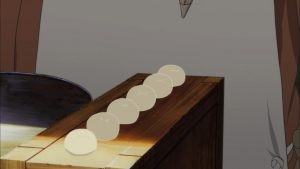 However, no matter when the question arises, Episode 10 is always at the top of the order. It’s on my very, very short list of favorite anime episodes of any series, in fact. It epitomizes everything that makes Seirei no Moribito great. It exemplifies all that makes this second act remarkable. It shows off how great Kamiyama Kenji’s original material is (not a letter of this is in the novel). And it showcases Chagum, an absolutely astonishing character, as well as any episode in the entire series.
However, no matter when the question arises, Episode 10 is always at the top of the order. It’s on my very, very short list of favorite anime episodes of any series, in fact. It epitomizes everything that makes Seirei no Moribito great. It exemplifies all that makes this second act remarkable. It shows off how great Kamiyama Kenji’s original material is (not a letter of this is in the novel). And it showcases Chagum, an absolutely astonishing character, as well as any episode in the entire series.
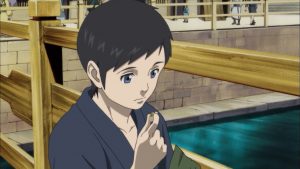 We keep looping back on certain themes here. The anime’s original material elevating the series, for one. And a tremendous level of tension and excitement driven by real-life, daily life situations. As with Episode 8, this one is absolutely gripping despite very little conventional “action”. And this time, we don’t even have the dramatic crutch of potential life-and-death danger to draw on – the tension is entirely organic to the situation itself. And the tenser things get, the more Chagum runs as cool as those cool blue eyes of his.
We keep looping back on certain themes here. The anime’s original material elevating the series, for one. And a tremendous level of tension and excitement driven by real-life, daily life situations. As with Episode 8, this one is absolutely gripping despite very little conventional “action”. And this time, we don’t even have the dramatic crutch of potential life-and-death danger to draw on – the tension is entirely organic to the situation itself. And the tenser things get, the more Chagum runs as cool as those cool blue eyes of his.
 The driver here is Balsa wanting Chagum to experience the life of a commoner. Why? Because she wants Chagum to have a real life, not just an existence. He’s safe with Tanda and herself, copes well with relative isolation, and isn’t the sort of boy to complain. But if this is Chagum’s future, Balsa wants him to be a part of the world, not just an outsider looking in. So she asks Touya, the ultimate townie, to show Chagum the ropes at being a city boy and an errand runner (though there’s precious little of that). Touya is understandably a bit nervous, even with Nee-san’s promise to be close by, but he’s nothing if not a gamer and agrees to take on the challenge.
The driver here is Balsa wanting Chagum to experience the life of a commoner. Why? Because she wants Chagum to have a real life, not just an existence. He’s safe with Tanda and herself, copes well with relative isolation, and isn’t the sort of boy to complain. But if this is Chagum’s future, Balsa wants him to be a part of the world, not just an outsider looking in. So she asks Touya, the ultimate townie, to show Chagum the ropes at being a city boy and an errand runner (though there’s precious little of that). Touya is understandably a bit nervous, even with Nee-san’s promise to be close by, but he’s nothing if not a gamer and agrees to take on the challenge.
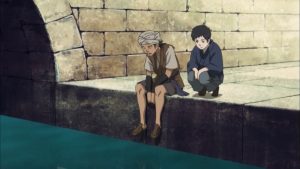 Touya (after asking Chagum to call him “Aniki”) shows the prince the ropes of semi-hustling a hekimoom vendor (this really comes down to haggling rather than cheating) and Chagum proves himself a good little actor. But it’s when the boys stumble upon a traveling “Mon Jin Zen” game that things really heat up. Three men have set up a traveling gaming table (a tout, a spinner and a jester with a drum) and the game is simple – three coins (black on one side, white on the other) are spun, and players bet on how many will come to rest with their white side up. Touya, exercising questionable judgment, bets an entire Rugal coin on Zen – which has the worst odds, but pays double when you win. Naturally, he doesn’t.
Touya (after asking Chagum to call him “Aniki”) shows the prince the ropes of semi-hustling a hekimoom vendor (this really comes down to haggling rather than cheating) and Chagum proves himself a good little actor. But it’s when the boys stumble upon a traveling “Mon Jin Zen” game that things really heat up. Three men have set up a traveling gaming table (a tout, a spinner and a jester with a drum) and the game is simple – three coins (black on one side, white on the other) are spun, and players bet on how many will come to rest with their white side up. Touya, exercising questionable judgment, bets an entire Rugal coin on Zen – which has the worst odds, but pays double when you win. Naturally, he doesn’t.
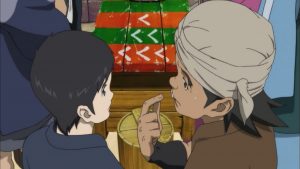 Even played straight, this would be an interesting game of chance. But it’s not – the tout and the spinner are rigging it, and Chagum spots this pretty quickly. As always with Moribito these moments are incredibly revealing, and we learns encyclopedic volumes about Chagum in the next ten minutes. We knew he was smart, but he’s really smart. He still has the imperiousness of a royal brat, despite his kindness and empathy. And he’s more or less willing to let this go as the natural outcome of having men base their livelihoods on a game of chance when he thinks Touya wants to use Chagum to get his money back. It’s only when Chagum sees that Touya is actually trying to help the others that he takes the bit in his teeth and intervenes himself.
Even played straight, this would be an interesting game of chance. But it’s not – the tout and the spinner are rigging it, and Chagum spots this pretty quickly. As always with Moribito these moments are incredibly revealing, and we learns encyclopedic volumes about Chagum in the next ten minutes. We knew he was smart, but he’s really smart. He still has the imperiousness of a royal brat, despite his kindness and empathy. And he’s more or less willing to let this go as the natural outcome of having men base their livelihoods on a game of chance when he thinks Touya wants to use Chagum to get his money back. It’s only when Chagum sees that Touya is actually trying to help the others that he takes the bit in his teeth and intervenes himself.
 There’s a real electricity to all this, as Kamiyama expertly lets the tension amp up with little embellishment on his part. Balsa’s grip tightens on her spear as she watches. A battle of wills between the tout and the boy rages quietly, and Chagum never blinks. And he gradually wins the skeptical townsfolk over to his side by the proof of his judgment. The men running the game are trapped – the coin spinner knows only one way to proceed, to be guided by the boss, and they can’t coordinate a change in routine without giving away their racket. Eventually Chagum, having blown their cover, is challenged to a legitimate game of chance by the boss, with his mother’s earring as his stake. And he has the nerves of steel to back up his intellect and conviction.
There’s a real electricity to all this, as Kamiyama expertly lets the tension amp up with little embellishment on his part. Balsa’s grip tightens on her spear as she watches. A battle of wills between the tout and the boy rages quietly, and Chagum never blinks. And he gradually wins the skeptical townsfolk over to his side by the proof of his judgment. The men running the game are trapped – the coin spinner knows only one way to proceed, to be guided by the boss, and they can’t coordinate a change in routine without giving away their racket. Eventually Chagum, having blown their cover, is challenged to a legitimate game of chance by the boss, with his mother’s earring as his stake. And he has the nerves of steel to back up his intellect and conviction.
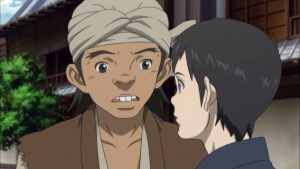 These middle episodes tell us so much, but not least they reveal the true depths of Chagum’s nature. Balsa is a superb protagonist, about as good as they get, but that fact is less surprising than Chagum’s greatness as a character. What we come to learn about this child is that he’s noble in the best sense of the word – not by birth, but through his goodness, courage, and strength of will. And it’s coming to understand that about Chagum that drives the tremendous emotional power bought to bear in the series’ second cour. Anime just doesn’t get much better than this.
These middle episodes tell us so much, but not least they reveal the true depths of Chagum’s nature. Balsa is a superb protagonist, about as good as they get, but that fact is less surprising than Chagum’s greatness as a character. What we come to learn about this child is that he’s noble in the best sense of the word – not by birth, but through his goodness, courage, and strength of will. And it’s coming to understand that about Chagum that drives the tremendous emotional power bought to bear in the series’ second cour. Anime just doesn’t get much better than this.


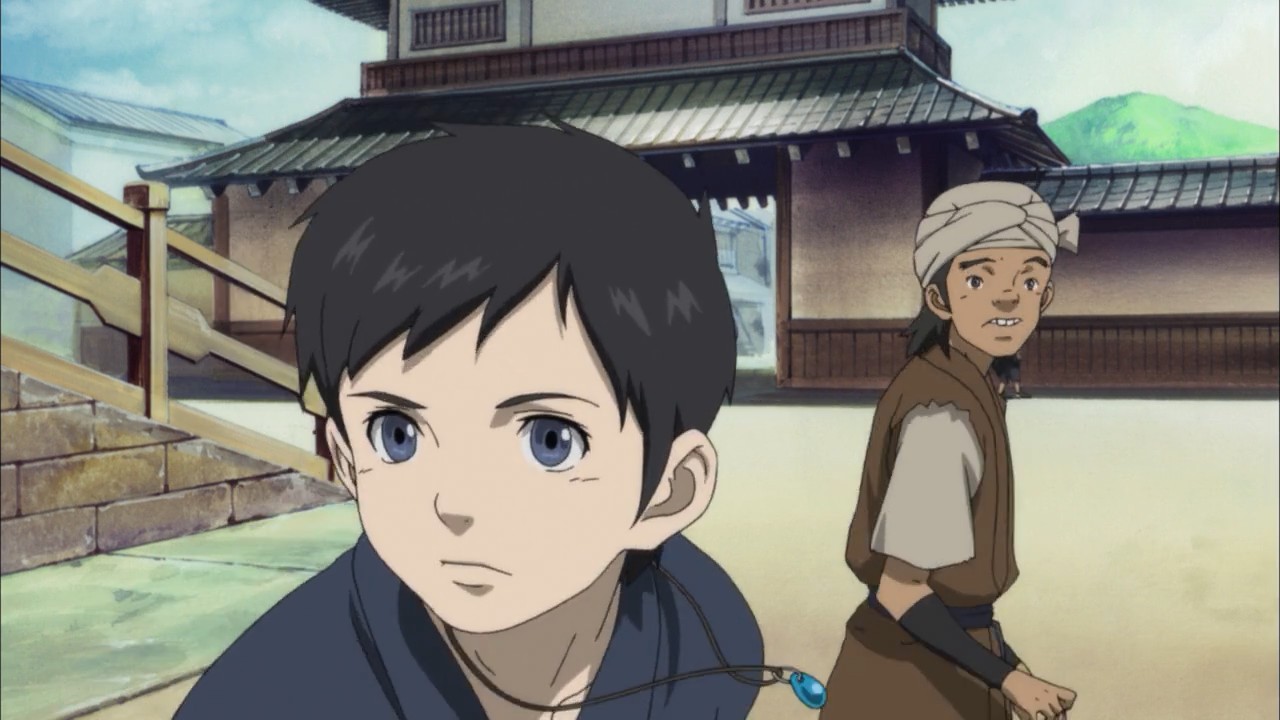
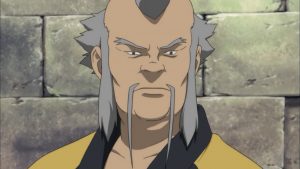






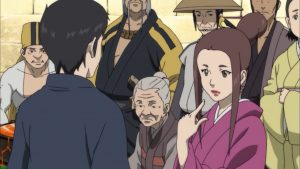
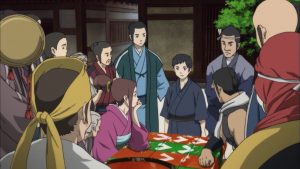
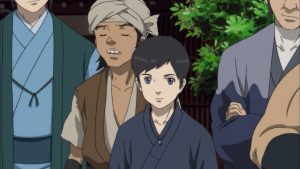

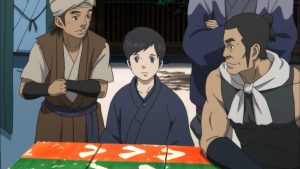
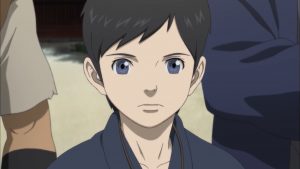



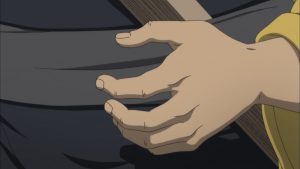
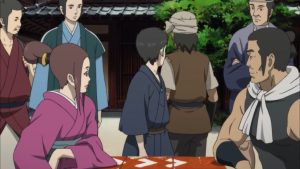
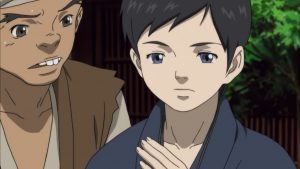
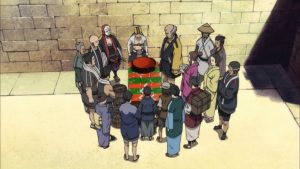
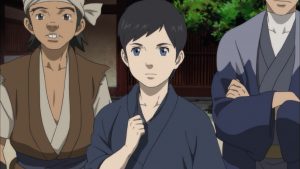


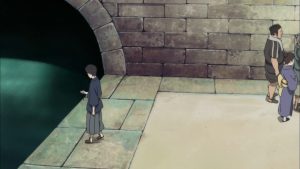


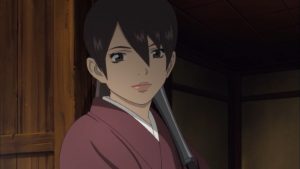
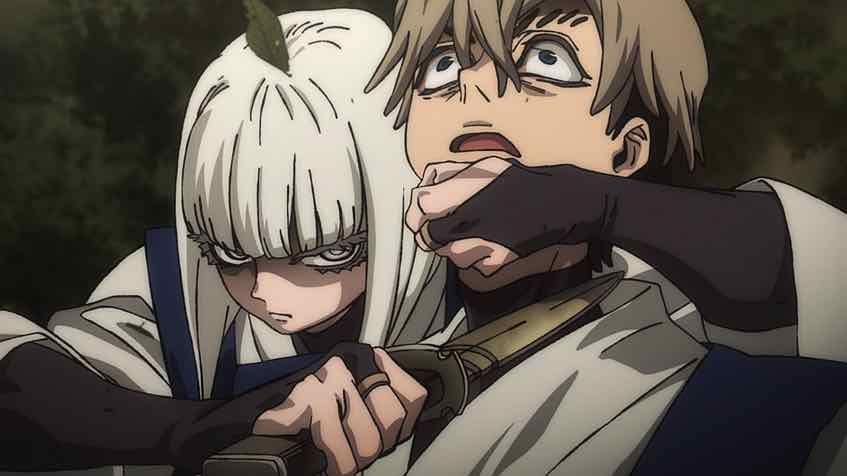

Panino Manino
May 28, 2020 at 3:41 amI understand that Chagum wining the game serves to “prove” that he was right, but I don’t like this outcome. I would have preferred if he had lost or at least if that game had no winners. Why? Because as the drama unfolded he became more and more “preachy”. Of course he’ll have a natural understanding of exploring the masses ignorance, wasn’t what his education was all about after all? In the beginning Chagum was going to be quiet because those people playing knew that was a foolish way to earn money and the gamblers were running a high stakes business. In the end the gamblers even appeared to be decent people! It’s annoying that Chagum does this so full of himself while claiming to be helping the poor ignorant plebe, so I would have preferred to see Chagum at least not wining and to see him also learning a lesson to be more “humble’.
But I can’t say that makes no sense for Chagum to be this smart. We already knew that he was very observant and attentive to details on people. Makes sense that he notices subtle changes in the behavior and posture of the gamblers because he grew up learning about protocol and proper manners.
Also, the way Touya is consistently “a bit’ dumb is also convincing and non offensive.
I don’t see the point of Balsa grabbing her spear. Just to communicate the “danger” to us? What could she do? Jump there and scare the people away? Going there with a spear would only worsen the situation.
Guardian Enzo
May 28, 2020 at 1:34 pmAre you kidding? If the hustlers decided to get physical with the kids (which absolutely could have happened) Balsa would have had to intervene.
I didn’t think the tout came off as a good person in the end at all. He played his con until Chagum completely blew it up, then he challenged him knowing he couldn’t refuse, trying to make up for his losses.
Panino Manino
May 28, 2020 at 11:48 pmFrom this point of view, yes, Balsa had no way to know how they could react, they could be violent people.
My point is, for me they didn’t appeared to be violent people. In any moment they showed aggressiveness towards Chagum, they just confronted his arguments and in the end they bet on acting honest. One honest game to give them the opportunity to return the money. They bet on luck rather than muscle.
Proto
May 28, 2020 at 11:21 amI’m not sure if I ever heard your opinion on the author’s other series Kemono no souja erin. Personally I found that while Moribito was emotionally deeper and was better as a character story type of work, the grand story in Erin had an epic scale that meshed well with the authors story telling style (so better as a story even if the characters were not as good). I ended up preferring Erin, though it’s not like I have to choose and only watch one. 😀
Guardian Enzo
May 28, 2020 at 1:30 pmErin is good, but for me not nearly as engaging as Moribito. The characters are way better here, and there’s plenty enough epic for my tastes.
Panino Manino
May 28, 2020 at 11:57 pmFor me Erin was just too slow.
Panino Manino
May 28, 2020 at 11:59 pmOther little detail from this episode.
We know that Touya would prefer to live together with Saya, and because his life is in the city it’s natural for him to want her back in the city with him. But when they talk how she is in the village it’s clear that Touya have another reason to want her in the city fast, marriage proposals.
I can’t decide if Balsa notices this or not.
Not that she would do anything to interfere or help.